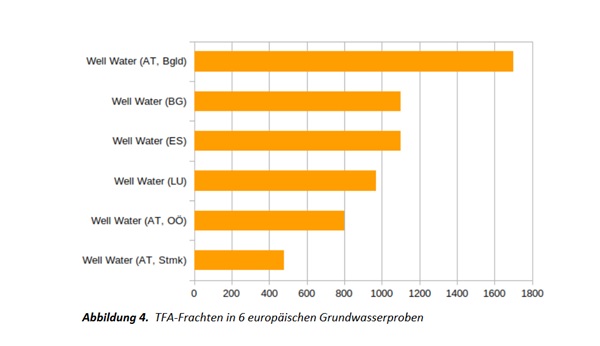 The TFA values in 6 European groundwater areas;
Credit: Mouvement Ecologique
The TFA values in 6 European groundwater areas;
Credit: Mouvement Ecologique
The Mouvement Ecologique, a Luxembourg-based voluntary environmental organisation has announced results of a study revealing water pollution with trifluoroacetic acid in Luxembourg and European countries’ groundwater.
A study presented on Monday 27 May 2024 by the Pesticide Action Network Europe (PAN Europe) and the environmental organisation Global 2000 revealed contamination of groundwater and rivers by the little-known and largely unregulated "forever chemical" trifluoroacetic acid (TFA).
The Mouvement Ecologique noted it contributed water samples from Luxembourg to this study, which also forms part of the statistics: all groundwater and surface waters from ten EU countries (six and 23 respectively) tested in the study showed “extremely high” TFA values. The Mouvement Ecologique called for urgent political action to achieve pollutant-free waters.
TFA, a persistent byproduct of PFAS chemicals (per- and polyfluoroalkyl substances, chemicals that resist grease, oil, water and heat), poses significant environmental and health risks due to its longevity and toxicity. Despite limited research on TFA's effects, known PFAS compounds have been shown to have severe health impacts, including reproductive issues and carcinogenicity. Recent studies revealed levels of TFA in water sources across the EU, surpassing safety limits and indicating widespread contamination, particularly in rural areas.
For this study, rivers and groundwater from ten EU countries were examined separately, with one sample being submitted per country. The study found high concentrations of TFA in water sources in Luxembourg, such as the Alzette River and a drinking water spring near Dommeldange. TFA levels ranged from 370 to 3,300 ng/l across all samples, with the Alzette near Mersch averaging around 1,220 ng/l and the Luxembourg drinking water source just under 1,000 ng/l. Near 79% of the samples exceeded the proposed EU Drinking Water Directive limit of 500 ng/l for "PFAS total," the Mouvement Ecologique stressed.
These findings challenge the belief that PFAS contamination is confined to industrial areas, highlighting widespread pollution, particularly in rural and agricultural regions, according to Mouvement Ecologique. Furthermore, the use of PFAS pesticides in Luxembourg exacerbates the issue, with almost half of the EU-approved PFAS pesticides being used in the country. The authors of the study and the Mouvement Ecologique therefore called for:
- a rapid ban on PFAS pesticides;
- the introduction of the new hazard classes Persistent, Mobile and Toxic (PMT) and very Persistent and Very Mobile (vPvM) in the EU Pesticides Regulation,
- the implementation of the general PFAS ban under the REACH Chemicals Regulation;
- the classification of TFA as a "priority substance" under the Water Framework Directive and
- monitoring obligations and limits for TFA.








